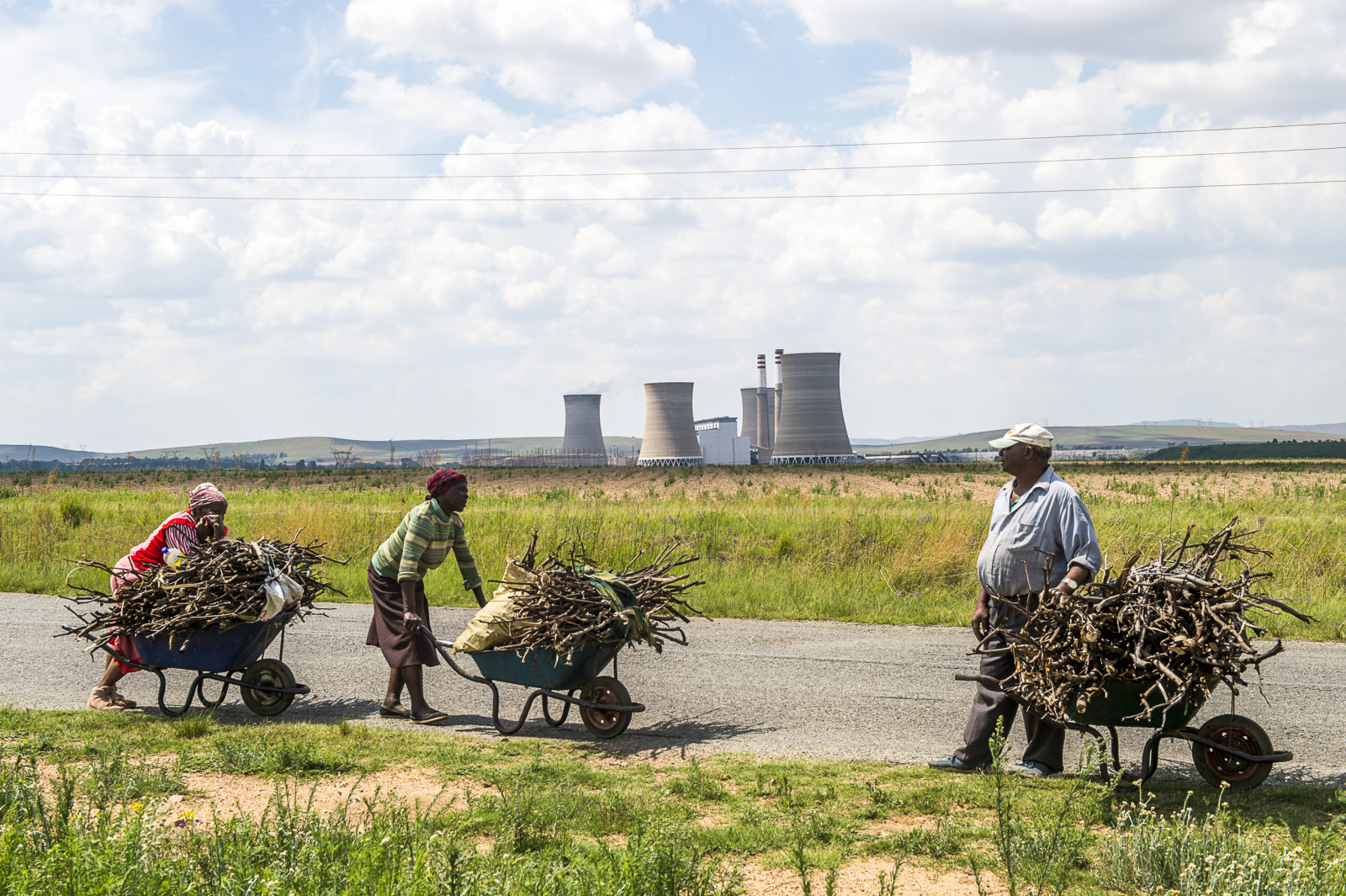Energy mix: People living near Grootvlei use wood, coal and electricity as fuel. (Delwyn Verasamy/M&G)
Community members living around Eskom’s Grootvlei power plant are threatening protest action against the utility for excluding them from job opportunities at the plant.
Residents have accused the utility of hiring external service providers and neglecting equally qualified companies in the community.
Threats to protest follow a meeting with Eskom management in Grootvlei last week where residents and job seekers complained about being excluded from contracts and job opportunities at the power station.
In their meeting, residents proposed that the utility include them in choosing projects for contracting and that big companies contracted by the utility should be available to mentor and help small companies to grow, thereby addressing unemployment in the community.
“We requested that a list of companies in the area must be created for tender allocation,” read the documents presented at the meeting. Community members are arguing that they should be involved in any big projects and jobs that come to the power station.
“We raised that each company that is chosen must be groomed by the big companies inside the power station. Failure to do this will result in a strike action and the transition will not happen without us,” they said.
In response, Eskom Grootvlei management said it will review the information presented and provide feedback on 18 June.
Grootvlei, near the town of Balfour, was constructed in the 1960s and mothballed in 1990 because of excess power at the time. In 2013, former president Jacob Zuma reopened it after a R7.2 billion upgrade. Grootvlei is set to reach the end of its operational life in 2027. It is also earmarked for transition to renewable energy after being identified as a potential training facility on energy. Discussions on this proposition are underway.
People in the area also told the Mail & Guardian that they are concerned and have a sense of unease about whether the power station would close or not.
In March, electricity minister Kgosientsho Ramokgopa called for a life extension of Eskom coal plants. While approved by the government, the Presidential Climate Commission, which is tasked with overseeing the transition, has argued against it.
In its report in May, the climate commission said the use of coal would be expensive to maintain in the future as they would lose investment opportunities.
Getting rid of coal and the use of fossil fuels is in line with the world climate goals towards a cleaner future. But people in Grootvlei are unsure of what this means for them.
Another Komati
Speaking to the Mail & Guardian, residents argued that if they kept quiet, they feared that Grootvlei would end up like Komati power station where people and contractors have not been absorbed into the transition and were left behind without work and a future.
“We have decided that it is better to fight now, to force the utility to see us now, and recognise that we need the work, and that our children deserve work. They cannot outsource companies from outside and leave us idle here to suffer.”
The community cannot die because Eskom is changing. If it is changing they must take us along with them,” said one of the participants at the meeting.
The country’s energy planning is within the mandate of the department of mineral resources and energy and its integrated resource plan 2019, which sets out the electricity plan until 2030, including the closure of existing power stations, Eskom said.
Anxiety
Members of Power, a town situated next to the Grootvlei power station, are anxious about what the future holds for them after hearing rumours regarding the future of the plant.
Sitting outside the station, a group of men seeking jobs say that the only thing they know about the transition is based on what they hear on the news as there has been no official consultations on the matter.
“We just hear rumours of the station closing down but then suddenly we are told that there is no such plan but that the power station is operating at 80%. So you can imagine the position we are in of not knowing where we stand. Are there jobs or are there no jobs?”
They said until there is official communication regarding the future of the station and their jobs, they will continue to sit outside the station with the hope that one day someone will call them in when there is a job opportunity.
One of the job seekers said that the town does not benefit from the power station as most people who work there are either from neighbouring towns or another province.
“We do not know any of the people who work at that power station, but by engaging with them we learnt that they are from places like Witbank and Secunda. Some come from as far as North West and Johannesburg. This tells you that there is something wrong with the system — it is against people from Grootvlei who are supposed to be getting first preference,” he said.
Without consultation from Eskom or the PCC, they are all in the dark, he said.
Knock-on effect
Lebohang Khumalo, a teacher at a local pre-school said that the majority of the children at the school’s parents work at the power station. She fears that should the power station shut down and the parents lose their jobs, it meant that she would also lose hers.
“We rely on them to keep the school afloat. Without their support we will have to shut down and I will have to uproot and move elsewhere which is not what I want because I love these children and I love my town,” said Khumalo.
Khumalo added that things will be very difficult for her and her family should things pan out that way.
Joe Vincent, who owns a lodge called Olive Grove which is eight minutes away from the power station, said that he is worried about his staff and the establishment.
He added that he saw the cracks quite early but still keeps the establishment running as he too has not been informed as to what will happen to the station.
“We used to be very busy. There would be contractors setting camp at the lodge for long periods at a time and that stopped. Every now and then we will have people come but that rarely happens” he said.
He said that he will do all he can to help his employees, adding that he has established a few businesses in the area.
“I will not abandon the area. It will always be a place for my children and colleagues or families to come for a holiday. I can’t just leave as this is the result of years of hard work. But if I am not able to make a living from it, at least my family will enjoy it” Vincent said.
Speaking during the Presidential Climate Commission‘s quarterly meeting on Friday, Mantashe said “just” wasn’t being applied at Komati.
“In terms of the number of jobs destroyed and the number of jobs created, the megawatts destroyed and those created. In all aspects, it is not a just energy transition. It is an energy transition,” he said.
At Grootvlei, the reskilling and retraining of workers on renewable energy has not started. Eskom has secured a R180 million grant from German development bank KfW to establish a renewable energy training facility at Grootvlei and “discussions are underway”.
Mandisa Nyathi and Lesego Chepape are climate reporting fellows, funded by the Open Society Foundation for South Africa.

















%20(2)%20(1).jpg)

Discussion about this post